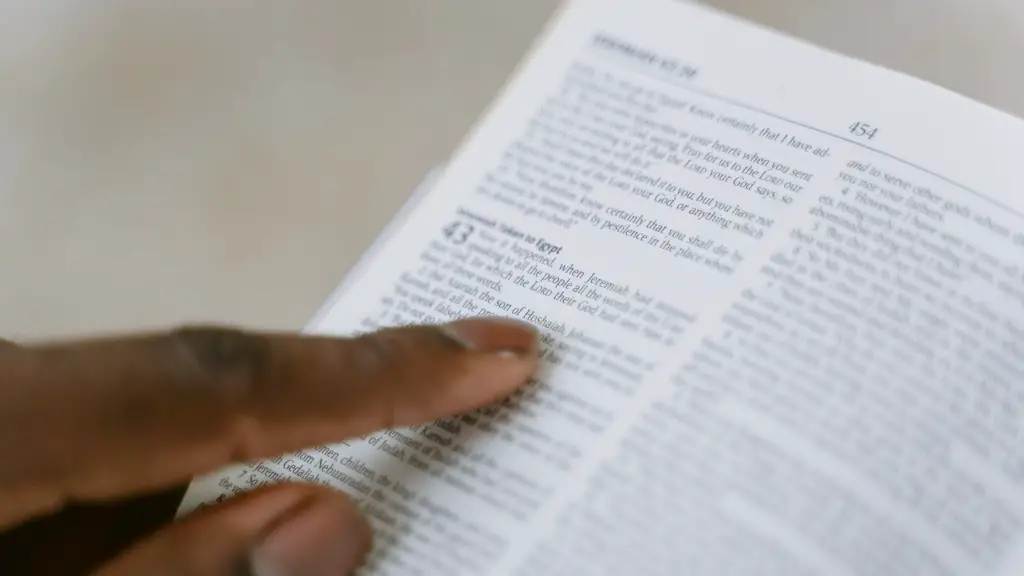Discernment is an important Christian spiritual gift that helps believers to make decisions with good judgment and proper understanding. Discernment involves looking at an issue with an open eye and engaging critical thinking to decide what is right and wrong. In the Bible, discernment is described as the ability to recognize truth from falsehood, and it is often associated with walking with the Lord. The Bible is full of examples of where discernment has been used for guidance and spiritual insight, and it is often a key factor in the decision-making process. Discernment is a powerful spiritual gift, and one that can be cultivated through prayer and obedience.
The Bible speaks clearly on the importance of discernment. In Colossians 3:2-3, it says: “Set your minds on things above, not on earthly things. For you died, and your life is now hidden with Christ in God.” Discernment involves being able to see the difference between spiritual and worldly matters. In Philippians 4:8-9 it states: “Finally, brothers and sisters, whatever is true, whatever is noble, whatever is right, whatever is pure, whatever is lovely, whatever is admirable—if anything is excellent or praiseworthy—think about such things.”
Discernment is often used to make moral and ethical judgements, or to see the bigger picture in a situation. It can be used to gain insights into difficult and complex issues, and to help Christians gain a deeper understanding of spiritual matters. In 1 Corinthians 2:14-15 it says, “The natural person does not accept the things of the Spirit of God, for they are folly to him, and he is not able to understand them because they are spiritually discerned. The spiritual person judges all things, but is himself to be judged by no one.” This verse underlines the importance of having a discernment that is rooted in the Spirit of God.
Discernment is a valuable tool for Christians, but it is important to remember that it is not a surefire way to make the right decision, as decisions still require prayer and thoughtful consideration. Discernment can be used to help inform decisions, but it should never be seen as a definitive answer. Discernment also needs to be balanced with a sense of humility and an understanding that you can be wrong. In Romans 12:2, it says “Do not conform to the pattern of this world, but be transformed by the renewing of your mind. Then you will be able to test and approve what God’s will is—his good, pleasing and perfect will.”
Discernment In Decision-Making
Discernment can be used to inform decisions when making difficult choices, such as in times of temptation or when faced with potential sin. In Hebrews 5:14, it says “But solid food is for the mature, for those who have their powers of discernment trained by constant practice to distinguish good from evil.” This passage highlights that having a deep knowledge of scripture and cultivating a disciplined life of prayer and obedience will give believers the power to differentiate between good and bad. Discernment can provide wise counsel to those seeking godly guidance, and it can be a helpful tool in decision-making.
Discernment should also be used to weigh both the long-term and short-term consequences of a decision. Sometimes the most spiritually beneficial decision may not be the most comfortable in the short-term, and being able to weigh the long-term results can help to inform decisions. Discernment should also involve being able to recognize when a decision is motivated by selfishness or pride. In Luke 16:13 it says: “No servant can serve two masters. Either he will hate the one and love the other, or he will be devoted to the one and despise the other. You cannot serve both God and money.” This highlights how discernment should be used to recognize when we are trying to serve two masters, and to choose the one that is more in line with God’s plan.
Discernment Among Believers
Discernment is also important for relationships between believers. In 1 Corinthians 5:11 it says “But now I am writing to you that you must not associate with anyone who claims to be a brother or sister but is sexually immoral or greedy, an idolater or slanderer, a drunkard or swindler. Do not even eat with such people.” This passage highlights how discernment should be used when it comes to relationships between believers, and how it can be used to recognize when someone is not living a lifestyle that is in line with God’s plan.
It is important to remember that discernment should involve more than just making decisions. Discernment is a spiritual gift that can be used to gain greater spiritual insight and to deepen your relationship with God. It can be used to recognize when a decision is not in line with God’s will, or to recognize when something is not in line with the truth of scripture. Discernment should also be used to sharpen our senses to recognize when we are standing apart from God, and how to bring ourselves back in alignment with his will.
Overcoming Discernment Challenges
Discernment can be a challenge for many believers, and it is important to remember to pray for guidance when it comes to making decisions. When making a decision, it is also helpful to think critically and to weigh the long-term results of a decision. It is also important to remember to be humble in the face of discernment, and to recognize that you may be wrong in your judgement. Lastly, it is important to remember that discernment is a spiritual gift that should be used to deepen your walk with God, and to gain a deeper understanding of the truth of scripture.
Seeking God’s Will Through Discernment
The Bible speaks clearly on the importance of recognizing God’s will in all matters. Romans 12:1-2 states, “Therefore, I urge you, brothers and sisters, in view of God’s mercy, to offer your bodies as a living sacrifice, holy and pleasing to God—this is your true and proper worship. Do not conform to the pattern of this world, but be transformed by the renewing of your mind.” This passage highlights that setting our minds on spiritual matters is more important than conforming to the ways of the world and that discernment can be an important tool in seeking the will of God. Discernment can be used to understand how God is speaking to us and to guide our decisions in line with his will.
Discernment And Understanding Of The Bible
Discernment can be used as an effective tool in understanding the Bible. It is important to remember to approach scripture with an open heart and mind, and to ask for guidance from the Holy Spirit. Discernment can help believers to gain a richer understanding of the truth of scripture and to apply biblical knowledge effectively. In 2 Timothy 2:7 it says, “Reflect on what I am saying, for the Lord will give you insight into all this.” This verse highlights the importance of reflecting on scripture in order to gain a deeper understanding of what God is trying to tell us and how discernment can be used to help this process.
Discernment And The Use Of Gifts From God
Discernment can also be used to recognize and utilise the gifts that God has given us. In James 1:5 it says, “If any of you lacks wisdom, you should ask God, who gives generously to all without finding fault, and it will be given to you.” This verse highlights how God will provide wisdom and discernment to those who seek him, and how discernment can be used to identify and utilise the spiritual gifts that God has given us. Walking in discernment can help believers to recognise how to use the gifts that God has given them for His glory and for their own benefit.
Discernment As A Spiritual Weapon
Finally, it is important to remember the power of discernment as a spiritual weapon. In Ephesians 6:11-17, it speaks of putting on the full armour of God in order to stand firm against the Devil. In verse 12 it says “For our struggle is not against flesh and blood, but against the rulers, against the authorities, against the powers of this dark world and against the spiritual forces of evil in the heavenly realms.” This passage highlights the need to call on the Lord and to use discernment in the face of spiritual opposition. Discernment can be used to recognize the lies of the Devil and to combat spiritual darkness.



